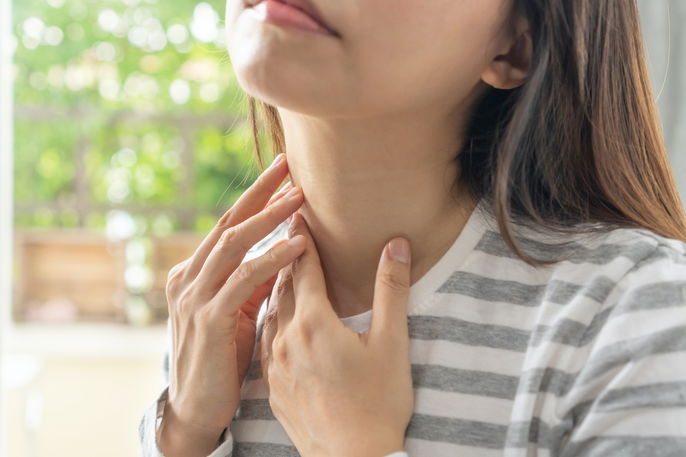A sore throat is a very common symptom and is usually caused by viruses like the common cold, flu, COVID-19. A sore throat can also emerge with allergies, dry air or exposure to irritants.
In most cases, sore throats are accompanied by other symptoms like headaches, body aches, general malaise, fever, sneezing, a plugged nose or watery eyes.
It is important to consult your doctor if you experience a sore throat, particularly if it presents with other symptoms. The doctor will identify the underlying cause to determine the most appropriate treatment.

What causes a sore throat?
The most common causes of a sore throat are:
1. Cold and flu
Cold and flu viruses are the most common cause of sore throats. The main entrance for viruses into the body is through the nose. These viruses which end up accumulating and multiplying in the mucous membrane of the throat, which leads to soreness and discomfort. Other symptoms of a cold or flu include coughing, fever, sneezing and head and body pain.
What to do: To help relieve symptoms, the doctor may recommend painkillers and anti-inflammatories for pain and fever. Antihistamines can help with a runny nose and sneezing, while cough syrups can help to soothe coughs. In some cases, if a bacterial infection develops, it may be necessary to take antibiotics.
Check-out some home remedies for the cold and flu that you can prepare to speed-up your recovery.
2. Bacterial infection
Sore throats can also be caused by bacteria, the most common being infection by Streptococcus pyogenes. This bacterium is naturally present in the mucous membrane of the throat, however an imbalance in microorganisms in the throat can lead to rapid growth and proliferation of strep bacteria, leading to infection. In addition, STIs such as gonorrhea or chlamydia can also cause a throat infection and a sore throat.
Read more about what causes strep throat and how it is treated.
What to do: Treatment usually consists of taking antibiotics, which should be prescribed by your doctor. The doctor may also prescribe painkillers to help relieve discomfort.
3. GERD
GERD, or gastroesophageal reflux, is characterized by the backflow of stomach content up to the esophagus and mouth. This stomach content tends to be acidic, and can therefore cause pain and inflammation in the throat.
What to do: To prevent a sore throat caused by the reflux of gastric contents, your doctor may prescribe GERD medication that reduces stomach acid production, antacids or stomach protectors.
Maintaining a GERD diet can also help to improve symptoms and prevent flare-ups.
4. Dry air and air conditioning
When the air in a room or in the climate is drier, the mucous membranes of the nose and throat tend to lose moisture. This can lead to throat irritation and discomfort.
What to do: Ideally, you should avoid air conditioning and prolonged exposure to dry environments when possible. You are advised to drink plenty of water throughout the day to keep the throat hydrated. Your doctor may recommend moisturizing nasal sprays which can also keep the throat moist.
5. Allergies
Sometimes, when an allergic reaction occurs, the throat can react and become irritated. Allergies may also present with symptoms such as a runny nose, watery eyes or sneezing.
What to do: The doctor may recommend taking antihistamines to relieve allergy symptoms. It is essential to identify what triggers your allergy to help to relieve and prevent symptoms.
6. Cigarette smoke and air pollution
Cigarette smoke and air pollution caused by wildfires, car emissions or industrial activities are also responsible for causing throat irritation.
What to do: Avoid enclosed spaces with cigarette smoke and go out into green spaces where the air is less polluted.
7. COVID-19
COVID-19 is a respiratory infection in which the first symptoms are a sore throat, dry cough, fever or excessive tiredness.
In addition, COVID-19 can cause other symptoms such as body pain, headache, loss of taste or smell, runny or blocked nose, for example. In more severe cases, difficulty breathing or shortness of breath can also occur.
What to do: it is important to isolate yourself, and to complete a rapid COVID test or a PCR test indicated by the general practitioner, to confirm the infection. If necessary, the doctor can prescribe medication to help relieve the symptoms.






























